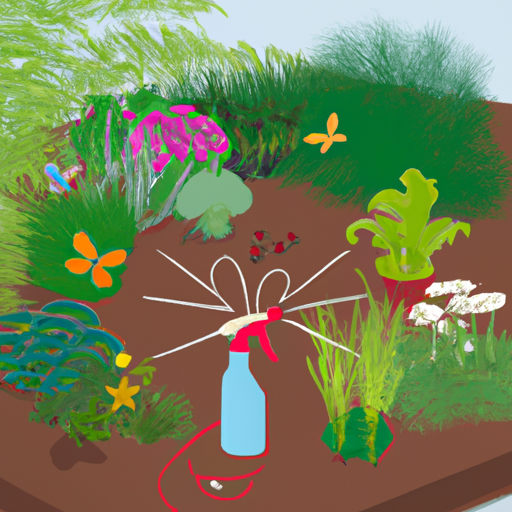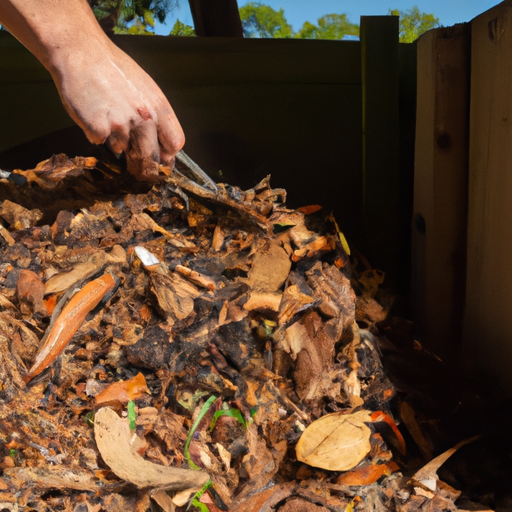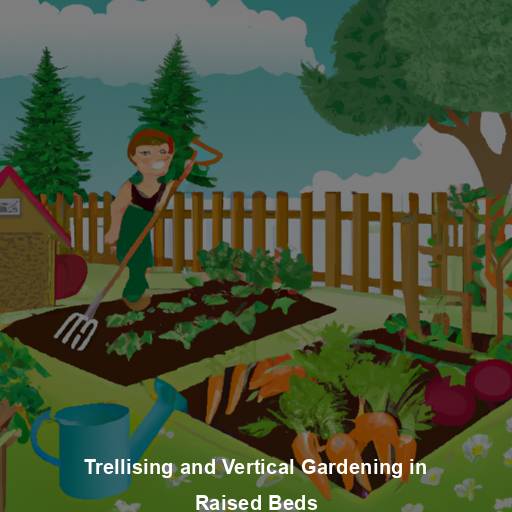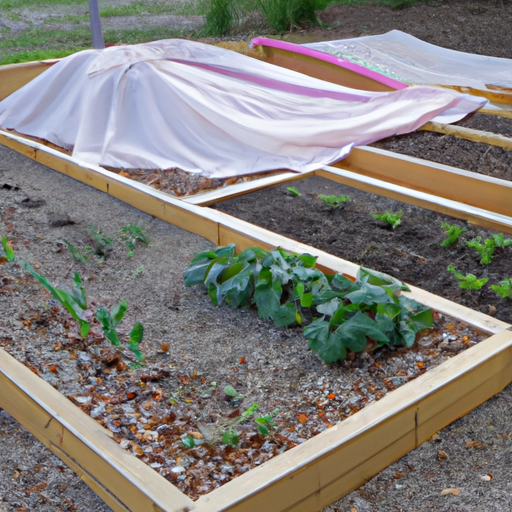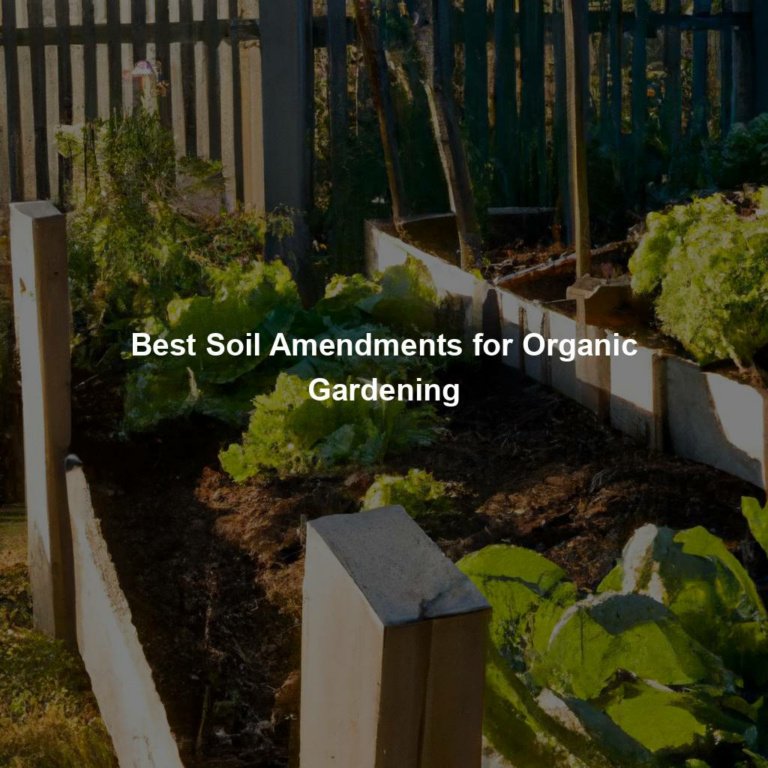Hey there fellow gardeners! Are you looking to improve your soil for a bountiful harvest this season? Look no further, because today we’ll be discussing everything you need to know about amending your garden soil!
First things first, let’s talk about why it’s important to amend your soil.
Over time, the nutrients in your soil can become depleted from previous crops and weather conditions. This can lead to poor plant growth and disappointing yields.
By amending your soil with compost or other organic matter, you can replenish those vital nutrients and create a healthier environment for your plants to thrive in.
So, grab your gardening gloves and let’s get started on creating the perfect growing medium for your garden!
Understanding Your Soil Composition
As a Master Gardener, I often compare soil to the foundation of a house. It is the base upon which everything else grows and thrives.
Understanding your soil composition is essential for successful gardening. Soil testing is the first step in determining what nutrients are present or deficient in your soil. Nutrient deficiencies can be identified through various tests such as pH level, nitrogen levels, phosphorus levels, and potassium levels.
Knowing this information will allow you to amend your soil accordingly to ensure that your plants have everything they need to flourish. So take the time to test your soil and discover its secrets!
Choosing The Right Amendments For Your Garden
Now that you have a good understanding of your soil composition, it’s time to choose the right amendments for your garden. It’s important to note that not all amendments are created equal and choosing the wrong one can actually harm your plants rather than help them.
When selecting amendments, there are two main categories to consider: compost vs fertilizer and organic vs synthetic amendments.
Compost is an excellent source of nutrients for your plants as it contains decomposed organic matter that has been broken down by microorganisms over time. Fertilizer, on the other hand, provides specific nutrients in concentrated doses but lacks the beneficial microbes found in compost. Organic amendments come from natural sources such as animal manure, bone meal or blood meal while synthetic amendments are manufactured using chemical processes.
When deciding which amendment to use, it ultimately comes down to personal preference and what works best for your specific garden needs. However, here are some things to keep in mind when making your decision:
– Compost improves overall soil health, structure, and texture.
– Fertilizers provide quick nutrient boosts but may contribute to chemical buildup if used excessively.
– Organic amendments typically take longer to break down but offer long-lasting benefits without contributing harmful chemicals to the environment.
– Synthetic fertilizers may be more convenient but can cause damage to soil ecosystems if used improperly.
As a Master Gardener, my recommendation would be to prioritize using organic amendments whenever possible and supplement with small amounts of fertilizer as needed. Remember that healthy soil equals healthy plants and choosing the right amendment will play a crucial role in achieving this balance.
So before heading out to purchase any old bag of fertilizer or amendment mix at your local gardening center, take some time to research different options and make an informed decision based on what will work best for both your garden and the environment.
How To Apply Amendments To Your Soil
Now that you have selected the appropriate amendments for your garden soil, it is time to learn how to apply them effectively.
There are various mixing options available depending on the type of amendment and your preferences. You can mix them with a shovel or hoe, use a tiller or cultivator, or even rent equipment such as a power aerator to ensure deep penetration into the soil.
It is important to note that different amendments require varying frequencies of application. Some may need only one-time application while others may require regular top-ups throughout the growing season. It all depends on the state of your soil and the requirements of the plants you intend to grow.
Remember to follow instructions carefully when applying amendments to avoid over-application which could lead to nutrient imbalances in your soil. Additionally, be patient as some amendments take longer than others to show results – but trust us, they will pay off in bountiful harvests!
Tips For Maintaining Healthy Soil
Maintaining healthy soil is crucial for the overall success of your garden. Understanding soil pH is a key factor in keeping your plants thriving, as different plants prefer varying levels of acidity or alkalinity. Regularly testing your soil and adjusting accordingly with products such as lime or sulfur can make all the difference.
Another important aspect of maintaining healthy soil is through composting techniques. Composting not only adds nutrients to the soil but also improves its structure, making it easier for roots to penetrate and absorb water and nutrients.
To ensure you are doing everything possible to maintain healthy soil, consider these tips:
– Add organic matter regularly
– Rotate crops annually
– Avoid over-tilling
– Use natural fertilizers
Remember that good gardening starts with good soil, so take care of it!
Maximizing Your Garden Yield With Amended Soil
To maximize your garden yield, it’s essential to use amended soil. Composting techniques and organic fertilizers are great ways to improve the quality of your soil.
By composting kitchen scraps, yard waste, and other organic materials, you can create a nutrient-rich fertilizer that will help your plants thrive. Organic fertilizers such as fish emulsion or bone meal can also provide additional nutrients for your garden without the use of synthetic chemicals.
When amending your soil with these products, be sure to mix them thoroughly into the top layer of soil to ensure even distribution. With enriched soil, you’ll see healthier plants producing more abundant yields in no time!
Frequently Asked Questions
Can I Use Organic Kitchen Waste As An Amendment For My Garden Soil?
Oh my goodness, using organic kitchen waste as an amendment for your garden soil is a game-changer!
Not only does it create a sustainable and eco-friendly way to dispose of food scraps, but the composting benefits are out of this world.
By adding nutrient-rich materials like coffee grounds, eggshells, fruit and vegetable peels, and even shredded paper to your compost pile or bin, you can create a powerhouse of beneficial microorganisms that break down the waste into rich fertilizer for your plants.
And if you’re looking for alternative amendments to traditional fertilizers, then look no further than your own kitchen scraps.
Trust me, as a Master Gardener with years of experience under my belt, I’ve seen firsthand how these simple changes can transform your gardening game.
How Often Should I Amend My Garden Soil?
When it comes to amending garden soil, determining your soil’s needs and scheduling amendments is crucial for success.
Best practices suggest that you should amend your garden soil at least once a year, preferably in the fall or spring when plants are dormant or just beginning to grow.
However, this depends on factors such as the type of soil you have and what types of crops you’re growing.
Common mistakes often include over-amending or using the wrong type of amendment, which can harm plant growth rather than enhance it.
By regularly testing your soil and following a proper schedule for amendments, you’ll be able to ensure healthy plant growth and a thriving garden.
Is It Necessary To Test My Garden Soil Before Applying Amendments?
To ensure the health of your garden, it is crucial to know the nutrient deficiencies in your soil.
Soil testing before applying amendments can save you time and money by identifying what specific nutrients are lacking or present in excess.
This will allow you to choose the appropriate amendments for your garden’s needs.
Without proper soil testing, you run the risk of over-fertilizing or under-fertilizing, which can harm your plants’ growth and development.
As a Master Gardener, I highly recommend taking the necessary steps to test your garden soil before making any amendments to promote healthy plant growth and avoid potential damage.
Can I Mix Different Types Of Amendments Together Before Applying Them To My Soil?
Mixing amendments can be a tricky process. While it may seem like a good idea to combine different types of amendments for maximum benefits, there are both pros and cons to doing so.
On one hand, mixing amendments can save time and effort when applying them to your soil. However, combining the wrong types of amendments can lead to negative effects on plant growth and soil health.
It’s important to choose the right amendments for your soil based on its specific needs and characteristics before considering mixing them together. As a Master Gardener, I always recommend conducting a soil test first to determine what nutrients your garden is lacking or has in excess.
This will help you make informed decisions about which amendments to use and how much of each to apply for optimal results.
How Long Does It Take For Amended Soil To Show Improvement In Plant Growth?
When it comes to garden soil improvement, one of the most common questions is how long does it take for amended soil to show improvement in plant growth?
The answer depends on several factors, including the specific amending techniques used and the plants being grown.
Generally speaking, you can expect to see some improvements within a few weeks or months after applying amendments such as compost, manure, or fertilizer.
However, more significant changes may take longer to manifest.
It’s important to be patient and continue monitoring your soil and plants over time to determine whether additional adjustments are needed.
Conclusion
In conclusion, amending your garden soil is a crucial practice in ensuring healthy and productive plant growth. By using organic kitchen waste as an amendment, you can save money while transforming your soil into a nutrient-rich environment for plants to thrive.
The frequency of amending will depend on the specific needs of your garden, but typically it’s recommended to amend once or twice per year.
Testing your soil before applying amendments is highly encouraged so that you can determine what nutrients are lacking and which amendments would be most beneficial.
Mixing different types of amendments together can also create a customized blend that caters specifically to your garden’s needs.
And finally, patience is key! It may take some time for amended soil to show improvement in plant growth, but with consistent care and attention, you’ll soon see the results of your hard work paying off.
So ask yourself: why settle for mediocre when you could have exceptional? With proper amending techniques and a little bit of effort, you can transform your garden into a flourishing oasis for all to enjoy.
As Master Gardeners always say – happy gardening!

